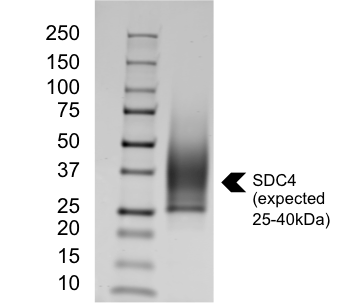Recombinant Human Syndecan-4 Protein, CF Summary
Product Specifications
Glu19-Glu145, with a C-terminal 6-His tag
Analysis
Product Datasheets
Carrier Free
CF stands for Carrier Free (CF). We typically add Bovine Serum Albumin (BSA) as a carrier protein to our recombinant proteins. Adding a carrier protein enhances protein stability, increases shelf-life, and allows the recombinant protein to be stored at a more dilute concentration. The carrier free version does not contain BSA.
In general, we advise purchasing the recombinant protein with BSA for use in cell or tissue culture, or as an ELISA standard. In contrast, the carrier free protein is recommended for applications, in which the presence of BSA could interfere.
2918-SD
| Formulation | Lyophilized from a 0.2 μm filtered solution in PBS. |
| Reconstitution | Reconstitute at 100 μg/mL in sterile PBS. |
| Shipping | The product is shipped at ambient temperature. Upon receipt, store it immediately at the temperature recommended below. |
| Stability & Storage: | Use a manual defrost freezer and avoid repeated freeze-thaw cycles.
|
Reconstitution Calculator
Background: Syndecan-4
Syndecan-4, previously known as amphiglycan or ryudocan, is a member of the syndecan family of Type 1 transmembrane proteins capable of carrying heparan sulfate (HS) and chondroitin sulfate glycosaminoglycans. The four vertebrate syndecans have two conserved cytoplasmic domains and divergent extracellular portions, except for HS attachment sites. Syndecan-4 is the most similar to Syndecan-2, but is more universally expressed and is found in virtually every cell type. Expression can be upregulated by TGF-beta 2 and in response to mechanical stress in smooth muscle, wound healing, arterial injury or acute myocardial infarction, probably in response to at least one inflammatory mediator (1, 2). Human Syndecan-4 is synthesized as a 198 amino acid (aa) core protein with an 18 aa signal sequence, a 127 aa extracellular domain containing three consensus Ser-Gly sequences for the attachment of HS side chains, a 25 aa transmembrane region and a 28 aa cytoplasmic tail (3). Human Syndecan-4 ECD shares approximately 79%, 78% and 81% aa identity with mouse, rat and porcine Syndecan-4 ECD, respectively. Addition of 20 - 80 disaccharides per side chain adds considerably to the size of the 20 kDa core protein. Non-covalent homodimerization of Syndecan-4 is dependent on the transmembrane domain (4). The HS chains can bind fibronectin, SDF-1, antithrombin, FGF-2, midkine and tissue factor pathway inhibitor and can present
FGF-2 to its receptors (1, 2, 5). Proteolytic cleavage by plasmin, thrombin or a metalloproteinase may create a functional ectodomain (6 - 8). Genetic disruption of the Syndecan-4 gene causes a mild phenotype, presumably due to compensation by other syndecans, but mice have an increase in placental thrombi as well as defects in wound healing and response to endotoxin shock (9, 10).
- Tkachenko, E. et al. (2005) Circ. Res. 96:488.
- Oh, E.-S, and J. R. Couchman (2004) Mol. Cells 17:181.
- David, G. et al. (1992) J. Cell Biol. 118:961.
- Choi, S. et al. (2005) J. Biol. Chem. 280:42573.
- Charnaux, N. et al. (2005) FEBS J. 272:1937.
- Schmidt, A. et al., J. Biol. Chem. 280:34441.
- Rauch, B. H. et al. (2005) J. Biol. Chem. 280:17507.
- Fitzgerald, M. L. et al. (2000) J. Cell Biol. 148:811.
- Ishiguro, K. et al. (2003) Glycoconj. J. 19:315.
- Echtermeyer, F. et al. (2001) J. Clin. Invest. 107:R9.
Citations for Recombinant Human Syndecan-4 Protein, CF
R&D Systems personnel manually curate a database that contains references using R&D Systems products. The data collected includes not only links to publications in PubMed, but also provides information about sample types, species, and experimental conditions.
6
Citations: Showing 1 - 6
Filter your results:
Filter by:
-
Role of Syndecan-4 in the Inhibition of Articular Cartilage Degeneration in Osteoarthritis
Authors: Hattori, Y;Hasegawa, M;Iino, T;Imanaka-Yoshida, K;Sudo, A;
Biomedicines
Species: Mouse
Sample Types: In Vivo
Applications: In Vivo -
Chain-specificity of laminin ?1-5 LG45 modules in the recognition of carbohydrate-linked receptors and intramolecular binding
Authors: Matsunuma, M;Kan, R;Yamada, Y;Hamada, K;Kanagawa, M;Nomizu, M;Kikkawa, Y;
Scientific reports
Species: Human
Sample Types:
Applications: Bioassay -
Syndecan-4 Is a Key Facilitator of the SARS-CoV-2 Delta Variant's Superior Transmission
Authors: A Hudák, G Veres, A Letoha, L Szilák, T Letoha
International Journal of Molecular Sciences, 2022-01-12;23(2):.
Species: Human
Sample Types: Recombinant Proteins
Applications: Bioassay -
Contribution of Syndecans to the Cellular Entry of SARS-CoV-2
Authors: A Hudák, A Letoha, L Szilák, T Letoha
International Journal of Molecular Sciences, 2021-05-19;22(10):.
Species: Human
Sample Types: Whole Cells
Applications: Bioassay -
LTBP-2 has multiple heparin/heparan sulfate binding sites.
Authors: Parsi MK, Adams JR, Whitelock J
Matrix Biol., 2010-04-09;29(5):393-401.
Species: Human
Sample Types: Recombinant Protein
Applications: Binding Assay -
A versatile polyacrylamide gel electrophoresis based sulfotransferase assay.
Authors: Wu ZL, Ethen CM, Larson S, Prather B, Jiang W
BMC Biotechnol., 2010-02-10;10(0):11.
Species: Human
Sample Types: Recombinant Protein
Applications: Enzyme Assay
FAQs
No product specific FAQs exist for this product, however you may
View all Proteins and Enzyme FAQsReviews for Recombinant Human Syndecan-4 Protein, CF
Average Rating: 5 (Based on 1 Review)
Have you used Recombinant Human Syndecan-4 Protein, CF?
Submit a review and receive an Amazon gift card.
$25/€18/£15/$25CAN/¥75 Yuan/¥2500 Yen for a review with an image
$10/€7/£6/$10 CAD/¥70 Yuan/¥1110 Yen for a review without an image
Filter by:





